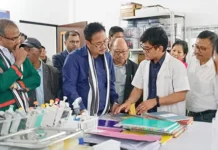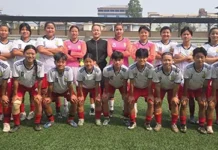[Nyatum Doke]
It has been a month since I heard the sweet bubbling melody of the water falling into my water tank. So, for obvious reasons, morning discussion with the neighbour would be about water. One morning I asked: “Why is there no protest or public debate or rally on the issue of water crisis in Longding?” while answering a query. My neighbour smirked and jokingly said, “The problem has been persisting for so long that it feels like we are programmed to endure water crisis from November to April. We both had a good laugh.
When I was posted newly, I was surprised to see people joking about the ‘issue of water’ in the district; to ask or talk about water crisis is like mocking oneself – people will scorn at you with “sabko pata hai (everyone knows it).” “The long pending water project, if materialised, will solve all the issues” is a clichæcopy;d phrase in the town, but I feel that the project may only bring water, but what about the distribution?
The issue is serious and needs an early discourse. This is not something which will vanish with time, but a problem that will further spread like cancer as the population grows and the town expands. It is not that Longding town is totally dry and devoid of any water; along with other things, the problem lies in our attitude and intent.
I meet people in Longding, so concerned about the ‘Russia-Ukraine’ war, but no one speaking about the reeling issue that they are living under, which is nowhere less than a war. Like in a war, whenever the topic is bought up, the blame will be levelled upon one single department or organisation. But I do not think one entity can be painted as being single-handedly responsible for this crisis.
For instance, a private water supplier can arrange any amount of water for Rs 1 per litre, but when it comes to the government agencies, “water sources are dry”, “vehicle damaged”, etc, are what they would reply. Then, there are people who do not use the water sustainably – when it is available, they will keep the tap open and let the water overflow from the tank. The people have to carry their share of blame for the unsustainable way of agriculture, and the mass deforestations due to jhum cultivation.
Whatever may be the reason, such crisis needs to be taken up seriously, and remedial measures to mitigate the impact and hardships must be taken up during peak seasons. Firstly, instead of supplying water to individual houses, water should be filled regularly in the general tank. Secondly, colony-wise roster needs to be maintained for water supply. Then, identify any leakages in the distribution channels. Source for collection of water needs to identified, and inputs from locals should be taken. Also, coordination between various other departments is needed, especially general administration. These are short-term immediate solutions that may be taken up. In addition, efforts towards conservation, preservation and management of traditional nallah/drains within the township area can be initiated, and along with it, small water tanks can be built.
Saying so, I am optimistically waiting for Chief Minister Pema Khandu to inaugurate the water project “ending all water woes” in Longding very soon, keeping his promise during Oriah 2022 visit. I am sure that, with the Jal Jeevan Mission’s tagline ‘nal se jal’ of the GoAP, the problem should be reduced if not solved. However, proper distribution channel must be ensured, along with identification of proper sources; in addition, well-trained technicians/workers is an imperative. We must understand that Jal without nal is meaningless and nal without jal would be farcical. Hence, along with “nal se jal,” focus should be more on “nal me jal”- getting water from tap is important, but at any point of time I would go for ‘water in tap’. (The writer is DIPRO, Longding.)


